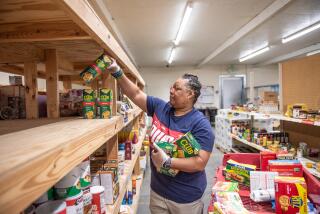Reagan Blames Hunger on ‘Lack of Knowledge’
- Share via
WASHINGTON — President Reagan, defending his Administration’s record on providing aid to the needy, said Wednesday that anyone who is going hungry in America simply does not know where to turn for help.
The President said that charitable donations had risen threefold in recent years and that much of it has been directed at shelters, food programs and school lunch programs. He said that “a lack of knowledge on the part of the people as to what things are available” is to blame for the continuing evidence of hunger in America.
“I don’t believe that there is anyone that is going hungry in America simply by reason of denial or lack of ability to feed them,” Reagan said. “It is by people not knowing where or how to get this help.”
The President’s remarks, made during a half-hour press conference with high school students, were reminiscent of a statement made in 1983 by then-presidential counselor Edwin Meese III, who aroused a storm of criticism when he told reporters that he had seen no “authoritative” evidence that children go hungry in the United States.
Meese maintained then that some people who can afford to buy their own meals go to soup kitchens “because the food is free.” Meese, who had called allegations of hunger in America “purely political,” eventually issued a public apology for his comments.
Upholds ‘Safety Net’
Reagan, for his part, has consistently maintained that even if welfare has been cut in some areas under his Administration, a “safety net” would remain to protect the “truly needy.”
However, Randy Katsoyannis, a staff mgmber for the House Select Committee on Hunger, said: “The statistics speak for themselves as far as we’re concerned. One in seven Americans are still living below the poverty level.”
But she conceded that large numbers of poor people are not taking advantage of federal programs designed to assist them. For example, 13.9 million, or 41%, of the 33.7 million Americans eligible for food stamps are not receiving them. And more than 70% of the 20.4 million who are eligible for the Women, Infants and Children Supplemental Feeding Program are not being served.
While agreeing with Reagan that many of these people do not know what’s available, Katsoyannis said: “These are federal programs, and it’s the government’s responsibility to make sure people are aware of them.”
Program Expained in Ads
To boost participation in the federal food stamp program, the National Ad Campaign--a private group funded by corporations--has begun an advertising drive to explain that the program is “not just a charity, but something you’re eligible for,” Katsoyannis said.
Lack of knowledge is only one barrier, she said. The complex forms required by the federal government are another obstacle that the poor frequently cannot comprehend. And overworked caseworkers are too busy to give the necessary assistance.
“The food stamp form is like an IRS form,” Katsoyannis said. “They just don’t understand it.”
Reagan has long felt that the government should provide for only “the truly needy” and that private sector giving should supplement federal efforts. “We’re unique in all the world,” he said, noting that Americans had donated $74 billion to charitable causes in 1984 and $79.8 billion in 1985. “It continues to go up,” he said.
However, as long as the demand for assistance continues to outstrip private and public programs, the President is almost certain to encounter difficulty in efforts to fully support his claim that people are hungry only because they do not know where or how to get help.
Study Shows Demand Rising
A January report by the U.S. Conference of Mayors, which surveyed 25 cities, indicated that the demand for emergency food in the nation’s urban centers exceeds donations by an average of 17%. And in some major cities, like Boston and San Francisco, that figure hits 50% and 55% respectively.
Privately run pantries around the country have told the House Select Committee on Hunger that they cannot keep up with the demand for free food. The Houston Metropolitan Ministries, for example, has reported a quadrupling in the number of those seeking assistance.
And, as a result of federal cutbacks in social programs and a tightening of eligibility requirements for assistance, more private organizations have turned their resources toward helping the homeless and the needy. One such group, the Food Marketing Institute, shows a phenomenal rise in the number of supermarkets donating surplus or day-old food to the poor.
More to Read
Get the L.A. Times Politics newsletter
Deeply reported insights into legislation, politics and policy from Sacramento, Washington and beyond. In your inbox twice per week.
You may occasionally receive promotional content from the Los Angeles Times.










